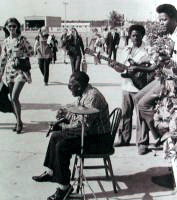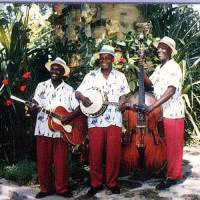Blake Higgs has no doubt left an indelible mark on the landscape of Bahamian music. He started developing his skills at an early age with the influence of his mother and older brother who played the guitar. Progressing from playing on a piece of wood with a string stretched across it, to the ukulele, he continued to master just about every stringed instrument until settling on the banjo. Blind Blake came to be a permanent fixture at the Nassau International Airport later in his life, but earlier, his career placed him in the company of kings and some of the most wealthy and powerful people in the world.
Alexander Maillis, a well-known Nassau lawyer and businessman claims to have given Blake Higgs, his childhood friend, his first break in the music business upon returning home from World War II. Maillis recalls that Blind Blake was not blind as a child, and further states that Blake suffered his fate from staring at the sun for extended periods. After serving time in the armed services, Maillis arrived at the seaport of Downtown Nassau where Blind Blake was playing for pennies. Maillis recalls saying to him, "What you doin' out here with this can playin for pennies! Come with me and play at our hotel" (Maillis 2004). That very evening, Blind Blake showed up with his ukulele at The Imperial Hotel that was owned and operated by the Maillis family, but was rejected by the small combo that was employed there at the time.
The combo even threatened to quit if Blind Blake was given a job at The Imperial. However, taken aback at Maillis’ advice that they were free to leave, in the final analysis, they remained, but took every opportunity to ridicule Blind Blake whenever he made any mistakes during his performances with them. After a short time, Blind Blake became quite popular, says Maillis. Tourists came to the Bahamas seeking out the man they referred to as “the Blind Minstrel".
In addition to playing for pennies in the Over The Hill areas of Nassau, Blind Blake would perform in other clubs and venues such as Dirty Dick’s, and Blackbeard’s Tavern, St. Mary's Schoolroom, the Orthodox Hall, and the Archer Club on East Street. But life as a musician wasn't always easy. It was not until 1933 that he found steady employment at the Royal Victoria Hotel where he spent 30 years entertaining tourists. The peak season for tourist visits were between the months of December to April, which provided only a small window of opportunity for musicians and others who relied on the tourism industry to make a living. During this time in the 30's, blacks were still not welcomed with open arms in the hotels and clubs downtown Nassau.
However, Blind Blake had a charm that kept him floating during the off-season in lodge halls and at private functions. It is said that the wealthy folks that frequented these islands were so pleased with Blind Blake that for years he collected his salary at the end of the season, living off the handsome tips received. When tourism finally became a year-round experience, locals were only exposed to this giant through his recordings. Out of these many recordings, it is not believed that Blind Blake gained any reward other than some degree of added publicity. In fact, persons like Harry Belafonte, Joan Crawford, and Acker Bilk recorded his songs.
In contrast to the mentioned international artists who credited Blake, however, there were many foreign producers, managers and related professionals who preyed on artists all over the Caribbean, taking ownership of their songs. Some of them ended up making ever so slight changes and registering them as their own with no credit to or arrangement with the true composers. Blake wrote many songs over his colorful career. Songs like "Conch Ain' Gat No Bone", and "Love Alone" that was written when King Edward VII abdicated the English throne to marry the woman he loved, are only a couple of the classics that he's left with us.
The controversy surrounding the song "Pretty Boy" (which was also recorded by George Symonette, Joan Crawford, Andre Toussaint and many others and was said to have been co-written with Eric Cash, a member of the Lou Adams Orchestra has been put to rest by Mr. Eric Cash himself. In an interview, Mr. Cash, himself an accomplished musician, claims to have been approached by Blind Blake for a copy of the lyrics for the song. Soon thereafter, he heard a recording being played. This of course didn't sit well with Cash. But nonetheless, he did not further pursue the issue due to unclear copyright laws at the time.

Entertaining tourists as they arrive at the Nassau International Airport.
There is no denying, however, that Blind Blake is another one of our unsung heroes, although it is claimed that he received a letter of commendation from Her Majesty Queen Elizabeth, in his later years, Blind Blake was seen by many as the old man with the banjo singing at the airport. Many passed him by, not knowing the value of the many contributions that he made not only to this country, but also to younger musicians, opening doors that probably would have still been closed today.



